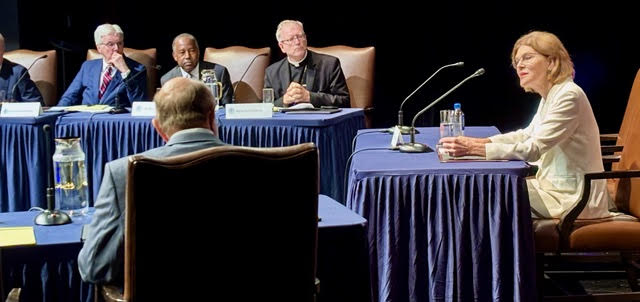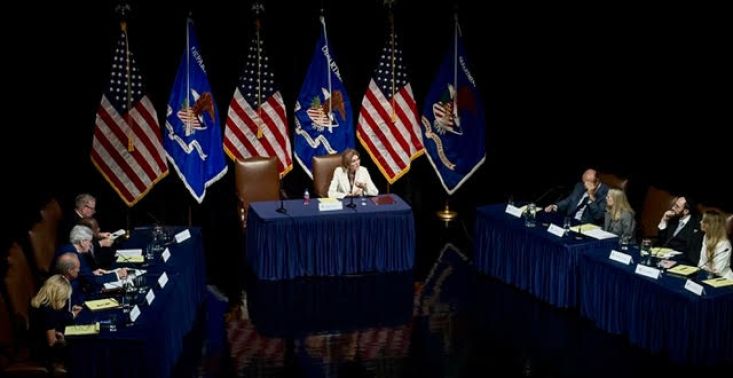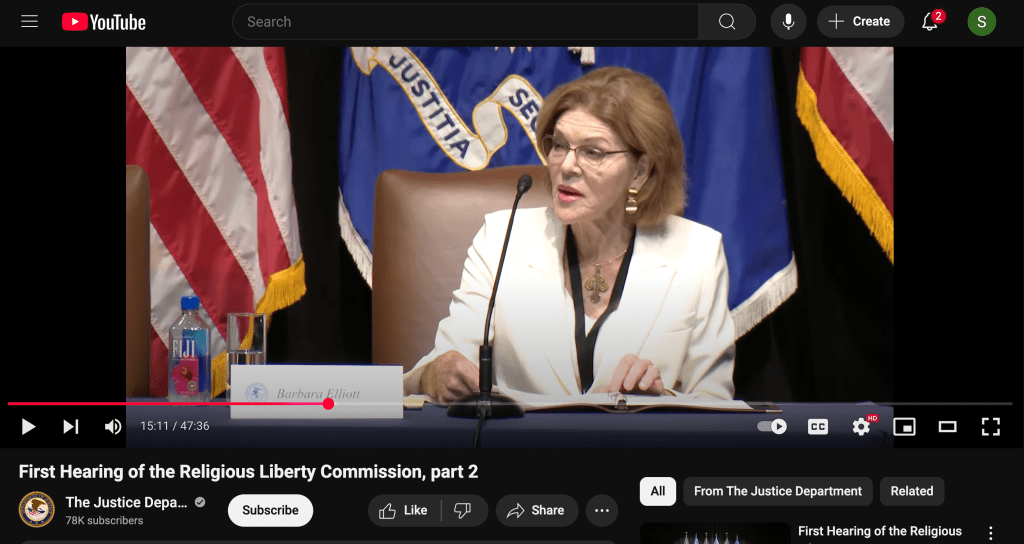Today in America, people of faith are binding up the unraveled fabric of civil society in tangible ways. We hold the threads individually, but when they are bound together, we can reweave a picture of order and beauty in human souls, woven in the vibrant colors of love.
People of faith have given our culture a unique strength throughout our history. With their awareness of the transcendent realm, the American Founders focused beyond the temporal in the search for meaning and a purposeful existence. They knew that the moral and spiritual strength of the people was crucial in making civic order possible. Long before the Constitution, people of faith were forming small units of order, cells of civil society, for self-governance and for helping one another. Before the first settlers even set foot on Plymouth Rock, they bound themselves to each other and to God in a form of government derived from covenant theology of the Old Testament – the Mayflower Compact of 1620. This was derived directly from the covenant of the Old Testament which bound Abraham, Isaac, and Jacob to the great I AM. These people promised to live in accordance with His law. Our Constitution has the same roots.
Faith and family were the bedrock of thriving communities, where good character was instilled, along with personal responsibility and a willingness to help others. When a barn burned down, neighbors would band together to build a new one for the victim of the flames. When parents of young children died, it was natural for a neighboring family to take in the children and raise them as their own. These expressions of Christian charity flowed naturally.
This vibrant good will in early America provided charitable assistance to the sick, the elderly, the senile, widows with children, unwed mothers, and the unemployed. Education was a high priority — people of faith in the colonies were instrumental in founding schools. Harvard College was founded in 1636, and St. John’s College in 1696. Americans created voluntary civic organizations, hospitals, and a variety of associations. When Alexis de Tocqueville visited America in the 1830s, he was dazzled by the wide array, and the good will they harnessed to serve others. This was very different than the culture in Europe, where the government and the Church had always been the prime movers. (I experienced this first-hand when I lived in Germany in the 1980s. When I launched a small private initiative to help people fleeing communism as the Berlin Wall came down, my skeptical neighbors said, “Oh that’s so American.”)
John Adams claimed, “Our Constitution was made only for a moral and religious people. It is wholly inadequate to the government of any other.” Civic order has most often flourished where it has rested on the moral and spiritual strength of the people who are governed from within. George Washington echoed this conviction, saying “national morality” cannot “prevail in exclusion of religious principle.”
The most potent and powerful unit for shaping the culture is the family. It is the matrix of all the primary beliefs, hopes, and aspirations that a person carries through life. The family is the core of civilization, the most important, irreplaceable, primary unit through which God has granted man participation in Creation. This is where we first learn the vocabulary of responses in life.
Beyond the family, Tocqueville discovered a variety of private voluntary associations in the community– people combining their efforts to solve a problem together. These are evidence of the principle of subsidiarity which, in both Catholic and Protestant thinking, places the resolution of human issues at the level closest to the people affected.
I did research all over the country, interviewing more than 300 people for my book Street Saints: Renewing America’s Cities. I discovered people quietly renewing the nation, living their faith one by one, and in small groups, mending hearts and souls with Love. How can we evaluate the effectiveness of faith-based organizations? When the great management guru Peter Drucker was asked that question, he said the answer lies in changed human lives –where there is tangible evidence of lasting changed behavior. That is evidence of transformation of the heart. The most effective services are based in a one-on-one, face-to-face relationship over time. This is true whether it’s a mentoring program for prisoners, or at-risk kids, or recovering drug addicts. If the relationship is rooted in God and anchored in prayer, the likelihood of transformation will be high.
This isn’t just academic research for me. My world expanded in colorful directions that caused my family consternation occasionally. The people I wrote about became friends. I found myself hanging out with a former Gangster Disciple in Fresno, and a former meth cook in Houston. In San Antonio, when I drove up to Freddie and Ninfa Garcia’s home, bullets were flying. But men’s heads were bowed over Bibles in their front yard. Ninfa always had a huge pot of beans bubbling on the back burner for anyone who wandered in. Anyone who stayed late in the evening might catch someone staggering in strung out on speed. They got a friendly welcome and someone would offer to sit with them through the night as they came down, hold a basin for them to be sick in, and find them a blanket. The next afternoon, when a group of visiting philanthropists disembarked from their bus, looking utterly out of place in this barrio, Freddie leaned over and whispered to me, “They would run out of here screaming if they had any idea how many felons are sitting right here in this room with them.”
The message Freddie delivered that day was straightforward: He said, “You can take a junkie and throw away his drugs and all you have is a reformed junkie. But you can take an addict and give him Jesus Christ and you have a completely transformed man.” He knows because he is one. Freddie was a heroin addict, so desperate for a fix that he laid his baby boy on the floor of a filthy gas station men’s room, where he was trying to shoot up. In a flash of lucidity, he thought, “My God, what kind of a father am I?” He found a faith-based group in California for help kicking his addiction. Then in his own living room, he began helping other addicts do the same, with God’s help. They would move in with Freddie and Ninfa to get clean, then help others with their journey as disciples. This is an old model going back more than 2,000 years, rooted in transformative love: the original faith-based approach.
Addicts often end up in prison – and they will tell you that starting a new life when you get out is one of the hardest hurdles ever. Prisoners get dropped off outside the prison with a few dollars and no idea what to do. Almost nobody wants to hire a person with felonies in their past. I helped launch a program to bridge the gap to employers willing to give them a chance. A man named Michael had been in and out of prison his entire life, alternating incarceration with living under bridges. His parents had lived a similar life. So the idea of getting a job and leading a “normal” life seemed far-fetched to him. But a man from a church ministry kept coming back to him under the bridge, bringing bottles of water and food to eat, and he kept talking with him. And he prayed with him. This man finally convinced him to move into a homeless shelter and start a job readiness program.
Michael was – let me be honest with you – a somewhat scary looking man. I have done enough inner-city ministry to have a wide range of experience. But Michael was weather-beaten and had terrifying scars. His father had put him in a burlap bag as a child, for fun –with his brother and a vicious animal, on top of a hot tin roof in a Houston summer. Around us, Michael would say exactly what he thought, without any filters, in terms without any nuance. So when he grabbed the microphone at his class graduation for unscheduled comments, none of us had any idea what to expect.
He said this: “I have lived like an animal my entire life. But I found my dignity on this Thursday, right here, because you loved me.” When he teared up, he was not the only one in the room.
Love makes all the difference. Love is the ingredient that transforms lives, lifts up the broken-hearted, restores hope, and heals all things. And love is something that no program can manufacture. It comes freely from the heart. Faith, hope, and love. Three manifestations of the virtues instilled by God. Faith is the root, hope is the stem, and love is the bloom.
People of faith are taking their love into their communities and living it by serving their neighbors. They are lifting hurting people to their feet and loving them into wholeness. They are going into prisons and serving as bridges of reconciliation between the victims of crimes and the perpetrators—people like John Sage in Houston, whose sister was murdered. To try to defuse his anger and depression, he sought out other people who had experienced similar tragedies. He discovered that in the telling, there was healing. From this was born his program, Bridges to Life. John takes teams of people into prisons to meet with prisoners. They each tell their story and hear the stories of the victims of crimes like the one they committed. They read Scripture about reconciliation. The prisoners write a letter asking forgiveness from the person they harmed. And they write a letter to someone in their family who was hurt by their incarceration– often a child, left behind at home. The act of asking for forgiveness is powerful – and effective.
The need for reconciliation runs through the nation. The Civil Rights movement called followers of Christ onto the streets to affirm the dignity and rights of all men and women as spiritual brothers and sisters. As Martin Luther King reminded us, we are citizens of two kingdoms – the eternal and the temporal – knitted together by morality that transcends boundaries of race. Man-made laws may draw boundaries, but only the higher law produces love. Only the higher law produces what Dr. King called “obedience to the unenforceable.”
The higher law demands restraint and courage. The Civil Rights Movement trained people not to return evil with evil – not to respond to violence with more violence. Black people sitting at a drugstore counter who were yanked off were trained not to return the aggression. These courageous people demonstrated extraordinary self-control in not ratcheting up the violence. When Jesus said, “Love your enemies,” Martin Luther King reminded us, He was calling for agape, the love that is “understanding and creative, redemptive good will for all men. An overflowing love that seeks nothing in return. Agape is the love of God operating in the human heart.”
Sometimes that fullness of Love demands a response to wrong. People of faith led the way in resisting communism, risking their lives in a peaceful revolution that ultimately brought the Berlin Wall down. I lived in Germany as this drama unfolded. I interviewed people from Poland, East Germany, Czechoslovakia, Hungary, and across the East Bloc all the way to Russia. I wrote about these courageous people in my book, Candles Behind the Wall: Heroes of the Peaceful Revolution that Shattered Communism. Tens of thousands of people poured onto the streets, facing down armed troops under orders to shoot them. Their only defense was a small candle they carried as they prayed. In the end, the forces of peace won, toppling the Berlin Wall and unraveling the Soviet Empire. It was a revolution of the spirit first.
Today in America, people of faith are binding up the unraveled fabric of civil society in tangible ways. We hold the threads individually, but when they are bound together, we can reweave a picture of order and beauty in human souls, woven in the vibrant colors of love. This is the design of the Creator, for which we were always intended.
Love can only be lived within relationship. Human persons are not designed to be merely clients of social services. We have been given life by our Creator for so much more. We were made by Love for Love. We have been given the capacity to receive Love, which is poured out over us freely and to share what we have received with others. This is the essence of what it means to be truly human. Augustine knew, “our heart is restless Lord, until it rests in thee.” Faith calls us to serve our Lord and our fellow creatures. We pray to live integrated lives, rooted in the earth while reaching toward heaven.
As my friend Joseph Pearce has written: At the heart of all healthy societies and cultures is the presence of the good, the true, and the beautiful. The Person of Christ is “the way, the truth, and the life,” the very life of beauty, “shining forth in the glory of creation as the Word-made-flesh, as the poem that perfectly reflects the perfection of the Poet.”
__________
The above address was presented to the White House Religious Liberty Commission on June 16, 2025 (Washington, D.C.).
Click the image below to watch Prof. Elliott’s testimony. The video includes Q & A with the Commissioners not included in the written text.
__________
The Imaginative Conservative applies the principle of appreciation to the discussion of culture and politics—we approach dialogue with magnanimity rather than with mere civility. Will you help us remain a refreshing oasis in the increasingly contentious arena of modern discourse? Please consider donating now.















